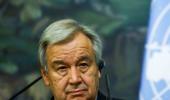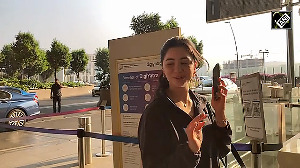Secretary General Antonio Guterres on Friday pledged to 'do everything' in his power during his second innings as the United Nations chief to contribute to a better future for all as the COVID-19 pandemic revealed the world's shared vulnerability, inter-connectedness and absolute need for collective action.

Guterres said this soon after the 193-member UN General Assembly appointed him as the Secretary General for a second five year term from January 1, 2022-December 31, 2026.
President of the 75th session of the General Assembly Volkan Bozkir administered the oath of office to the 72-year-old former Portuguese prime minister.
'This is a solemn moment. I find myself experiencing a whirlwind of emotions and thoughts. I am deeply honoured and grateful for the trust you have placed in me to serve as the Secretary-General of the United Nations for a second term. Serving the United Nations is an immense privilege and a most noble duty,' Guterres said in his remarks to the General Assembly after his oath of office.
Guterres said the world is 'truly at a crossroads', with consequential choices before it.
'Paradigms are shifting. Old orthodoxies are being flipped. We are writing our own history with the choices we make right now.
'It can go either way: breakdown and perpetual crisis or breakthrough and prospect of a greener, safer and better future for all.
'There are reasons to be hopeful,' he said.
The COVID-19 pandemic has revealed 'our shared vulnerability, our inter-connectedness and the absolute need for collective action. We feel a new momentum everywhere for an unequivocal commitment to come together to chart a course towards a better future.
'I pledge to you that I will do everything in my power during my second term in office to contribute to the positive, breakthrough scenario,' Guterres said.
Underscoring that equity needs to start now, he said, 'vaccines need to be available for everyone everywhere and we must create the conditions for sustainable and inclusive recovery both in the developed and developing world.'
Guterres pointed out that all of this will only be possible if 'we manage to overcome the current trust deficit that has a corrosive effect on societies and between countries.
'In particular, we need to do everything we can to overcome current geostrategic divides and dysfunctional power relations. There are too many asymmetries and paradoxes. They need to be addressed head-on,' he said.
Guterres, the ninth Secretary-General of the United Nations, took oath of office on January 1, 2017 and his first term ends on December 31 this year.
Guterres served as the United Nations High Commissioner for Refugees for a decade from June 2005 to December 2015.
Guterres, nominated by the Government of Portugal, has been the only official candidate for the position of Secretary General and his re-election was a given.
There has been no woman Secretary General in the UN's 75-year history and Guterres' re-election will mean that any possibility of having a female lead the world organisation can come only after 2026.
On June 8, the 15-nation Council had held a closed meeting where it adopted by acclamation the resolution that recommended Guterres' name to the 193-member General Assembly for a second five-year term as Secretary General from January 1, 2022-December 31, 2026.
India had expressed its support for re-election of Guterres as UN Chief and welcomed the adoption of the resolution recommending his name.
Last month, External Affairs Minister S Jaishankar met Guterres at the United Nations headquarters and expressed New Delhi's support to him for his second term as the world's top diplomat.
'India values UNSG's leadership of the UN, especially in these challenging times. Conveyed our support for his candidature for a second term,' Jaishankar had said in a tweet after the meeting.
Under the UN Charter, the Secretary-General is appointed by the General Assembly upon the recommendation of the Security Council. Each Secretary-General has the option of a second term if they can garner enough support from member states.
Guterres said the international community has managed together to embark on an important reform process in the development, management, as well as peace and security areas.
He asserted that there is a need to consolidate the current reforms, build on their results and continue to develop new methods of work to be able to deliver to the world.
"I have talked about a United Nations 2.0, and it is clear to me that we need to accelerate transformation through a quintet of change in the years ahead: better data, analysis and communications; innovation and digital transformation; strategic foresight; stronger performance and results orientation; and a work culture that reduces unnecessary bureaucracy, simplifies and fosters a work of collaboration."
Guterres said the current complex challenges can be met successfully with a humble approach -- one in which the Secretary-General alone neither has all the answers; nor seeks to impose his views; one in which the Secretary-General supports Member States and relevant stakeholders to lead the necessary changes and makes his good offices available, engaging tirelessly, working as a mediator, a bridge and trust-builder and an honest broker to help find solutions that benefit everyone involved.
Human Rights Watch said that with his re-election behind him, the Secretary-General should start calling out all governments that commit human rights abuses, including those that are powerful and protected.
"He's condemned the likes of Myanmar and Belarus. But China shouldn't get a free pass in the form of 'private diplomacy' for its crimes against humanity in Xinjiang. Nor should Russia over its support for Syrian government atrocities.
"Guterres' legacy will depend on his willingness to speak out for all the oppressed, wherever they are," UN director at Human Rights Watch Louis Charbonneau said.











 © 2025
© 2025